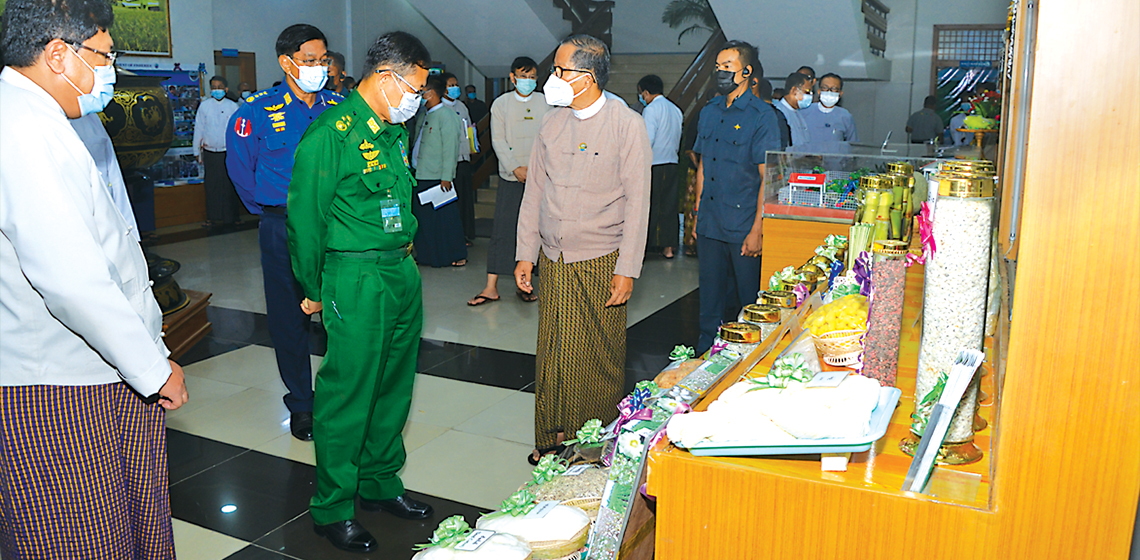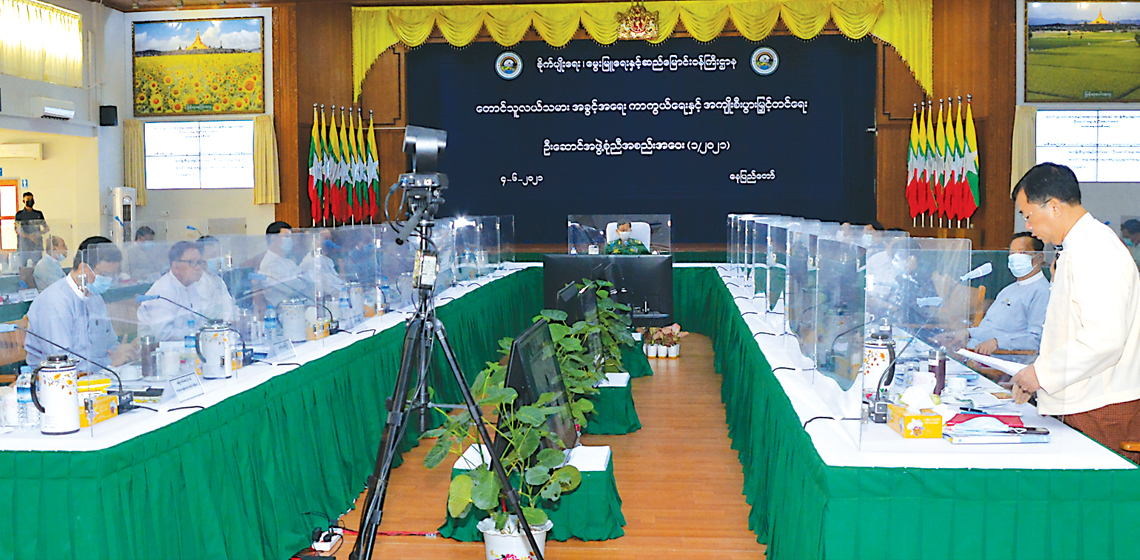Vice Chairman of State Administration Council Vice-Senior General Soe Win delivers address at plenary meeting 1/2021 of Leading Body for Protection of Farmers’ Rights and Enhancement of their Benefits
Nay Pyi Taw June 4
The plenary meeting 1/2021 of the Leading Body for Protection of Farmers’ Rights and Enhancement of their Benefits was held at the Ministry of Agriculture, Livestock and Irrigation here at 1.30 pm today, with an address delivered by Leader of the body Vice Chairman of the State Administration Council Deputy Commander-in-Chief of Defence Services Commander-in-Chief (Army) Vice-Senior General Soe Win.
Also present were Union ministers, who are members of the body, the Union attorney-general, the chairman of Nay Pyi Taw Council, the governor of Central Bank of Myanmar, deputy ministers, chairmen of associations and officials. Chairmen of region and state administration councils also took part in the meeting through video conferencing.
Speaking on the occasion, the Vice-Senior General said Myanmar is an agro-based country. So, the effective improvement of the socioeconomic life of farmers of the rural areas, who represent 70 percent of the country’s population, is an immediate requirement that is so important for the country. The past successive governments had beefed up the task of protecting the rights and promoting the benefits of farmers.
The Law for Protection of Farmers' Rights and Enhancement for their Benefits (2013) was enacted in 2013. The law comprises eight chapters with 29 sections. Section 3 in Chapter II mentions five objectives of the law. Sub-Section (a) is to support the farmers with disbursement of suitable loans, Sub-Section (b) to arrange smooth provision for techniques, inputs and production to farmers, Sub-Section (c) to give assistance to farmers to get reasonable prices and market for agricultural products, Sub-Section (d) to effective perform protection of rights of farmers who own small plots of farmlands and enhance of benefits and Sub-Section (e) to provide assistance to farmers for damage and loss in natural disasters as much as possible.
The firm rules for five objectives of the law were drawn and the law was amended with adding two more objectives with the aim of ensuring safety of farmers in farming rights and emergence of farmers’ organizations. So, Sub-Section (f) is to help farmers not to lose in farmland confiscation and protect them for safety of farming rights, and Sub-Section (g) to carry out emergence of a farmer organization law. The committee aims to ensure food sufficiency of the State, full nutrition of the citizens, more exportation of products from agricultural and livestock sectors, increase of income for farmers and development of socio-economic lives. As such, those attending the meeting are responsible for protection of the rights of farmers who own small farm plots and enhancement of their benefits in accord with the essence of the law.
For effectively implementing the provisions of the law, not only the government but also the steering committee must reconstitute the work committees and task forces with participation of representatives from Union ministries, region and state administration councils and non-governmental organizations, and these work committees and task forces are to invite entrepreneurs to cooperate with them in the tasks.
The Vice-Senior General further urged the work committees and task forces to coordinate with relevant ministries in transfer of agriculture and livestock techniques, quality control for quality seeds, fertilizers, pesticides and agricultural machinery and systematic usage, reduction of natural disaster risks and rehabilitation tasks, enhancement of domestic crop productivity and seeking the reasonable prices and market of agricultural and livestock products. The Vice-Senior General called for the emergence of farming system with mutual benefit involving private entrepreneurs, input companies and growers for acquiring investment in carrying out agricultural and livestock breeding tasks and ensuring strong crop market price. Preparations must be made to reduce crop damage caused by climate change such as floods and draught. Moreover, supervisory measures must be taken to repair dams, embankments and ditches and get correct data about loss and damage the farmers had to suffer.
Region and state administration councils need to emphasize plans to provide crop assistance as quickly as possible.
High per-acre yield plays a key role in improving income of individual farmers. There are high per-acre yield and extended cultivation acreage and attention must paid to the former. Full utilization of quality strains, correct inputs, proper irrigation and drainage system and six ways to getting irrigation water will increase per-acre yield. Fourteen scientific agricultural methods must be disseminated to farmers.
Agriculturalists responsible for respective regions and states also need to know four ways in nurturing plantations, two ways in growing crops, three ways in growing of plants in set plots, one way each in ensuring proper drainage and using inputs and two ways in harvesting and share them with local farmers.
Model plantations must be set up with both theory and practice in districts and townships of regions and states. Only then, will per-acre yield increase, thereby promoting interests of farmers. Increased income that follows products will contribute to national economy. As these points benefit each other, those present at the meeting need to pay attention. Relevant ministries need to make direct contacts between national private entrepreneurs and local farmers in order to easily distribute equipment related to ploughing, weeding, harvesting and storing, agricultural inputs, farm cattle, machinery, water pumps and harvesters at fair prices. And this means protecting the rights and interests of farmers. The Vice-Senior General then stressed the need for those in attendance to make open discussion and seek solutions for full implementation of the provisions of the law.
Secretary of the body Union Minister for Agriculture, Livestock and Irrigation U Tin Htut Oo reported on formation of the leading body and future tasks.
Afterwards, members of the body and union ministers U Win Shein, Admiral Tin Aung San, U Aung Than Oo, U Khin Maung Yi, Dr Pwint Hsan and Dr Thet Thet Khaing and Union Attorney-General Dr Daw Thida Oo, Governor U Than Nyein of the Central Bank ofMyanmar, Chairman of Nay Pyi Taw Council Dr Maung Maung Naing, chairmen of state and region administration councils and chairs of other organizations reported on task being carried out for protection and promotion of peasants’ rights and interests in respective sectors and future measures.
Then, Joint Secretary of the body Deputy Minister Dr Aung Gyi and Chairman of Agricultural Products Management Organization Deputy Minister U Nyunt Aung read out orders and sought approvals of the organization.
Afterwards, Union Ministers U Tin Htut Oo and Dr Pwint Hsan, Vice President U Ye Min Aung of the Union of Myanmar Federation of Chambers of Commerce and Industry generally discussed matters related to setting basic reference prices for seasonal crops like pulses, beans and onions in the similar way as basic reference prices for rice are set.
Afterwards, Vice-Senior General Soe Win, head of the body, gave a concluding address saying that it was required for ministries concerned to scrutinize the suggestions submitted at the meeting and to cooperate. It is needed to successfully implement respective tasks as necessary working committees have been formed, to make plans for marketable perennial crops to flourish and have markets locally and internationally. Planting the crops is helpful to enjoying commercial success and combating deforestation. It also supports the weather as well. Therefore, it is to give encouragement not only to cultivating basic crops but to planting perennial crops under title of lifestyle. In livestock farming, it is necessary to consider availability of good species for better production and markets. Regarding agriculture, it is required for ministries concerned and regions and states to work together for having good species suitable to regions and ensuring increase in products through sharing technical know-how.
Then, the Vice-Senior General took a tour around the departmental booths of the Ministry of Agriculture, Livestock and Irrigation. Union Minister U Tin Htut Oo and officials briefed him on items on display at the booths.

